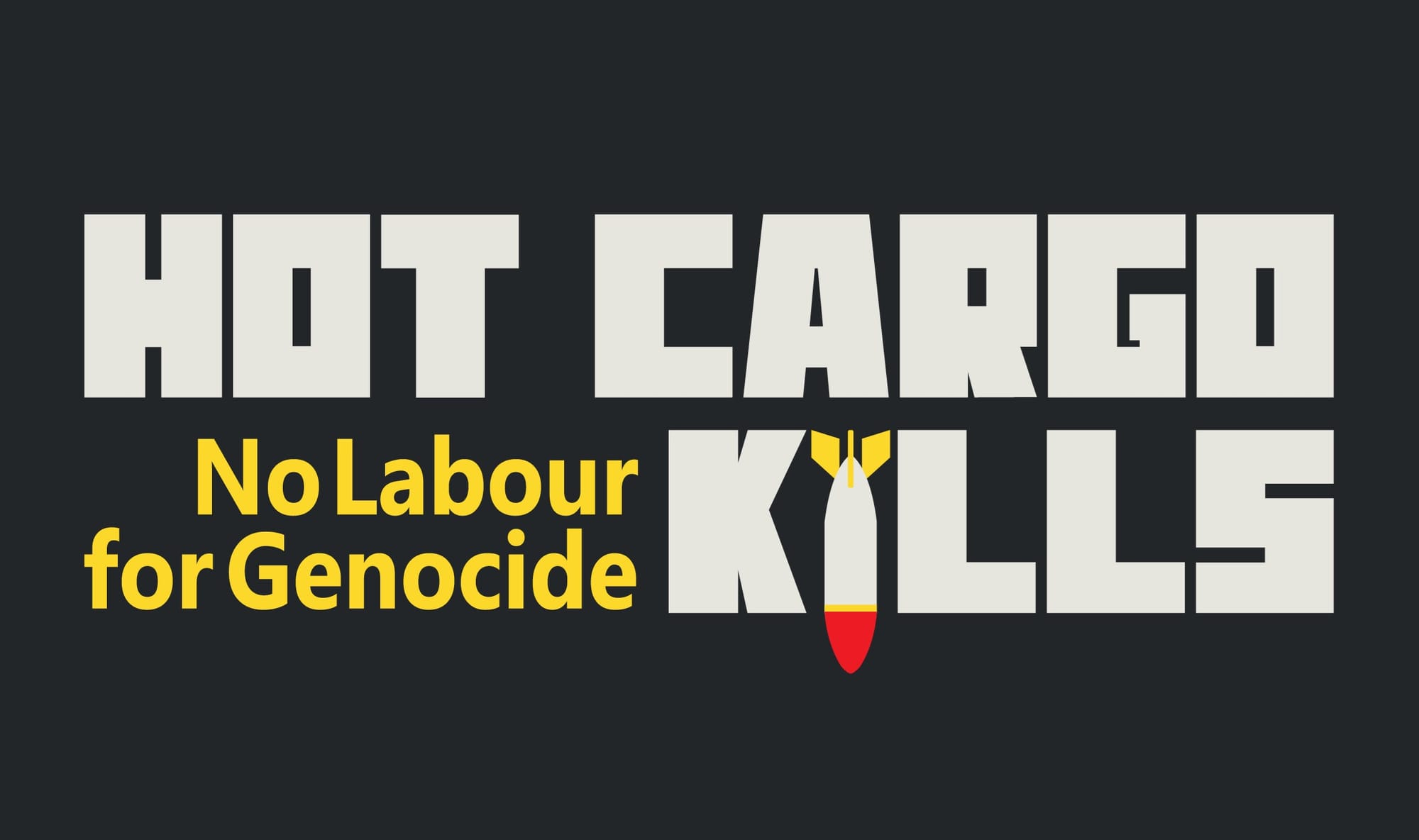
Labour 4 Palestine (L4P) is calling on the Canadian Labour Congress (CLC) to declare all Israeli goods and services “hot cargo.” L4P, an organization of labour activists standing in solidarity with Palestinians, is also asking union members and workers to add their names to the call.
At the time of writing, L4P is roughly halfway toward its goal of sending 51,200 letters to Canada’s national labour federation. The CLC is Canada’s highest labour body, made up of affiliated unions and local labour bodies and representing more than 3 million workers.
The L4P’s call forcefully declares: “Since October 2023, Israel has waged a genocide against Palestinians, committing unspeakable war crimes – with Canada’s support. The Israeli army is using weapons produced by Canadian companies to murder Palestinians and to bomb hospitals, schools, and refugee camps in Gaza.”
Through its “hot cargo kills” campaign, the organization is therefore demanding that the peak organization of Canadian labour call on its affiliate unions to cease handling these weapons of war and their critical component parts. According to an investigation at The Breach, Ottawa-based Gastops is the only company in the world producing engine sensors for the American-made F-35 combat jets used to drop bombs on Palestinians. Thus, despite Canada’s arms trade being much smaller than the United States, this country plays a critical role in facilitating Israel’s assault on Palestine.
“Hot cargo” is a term used in the labour movement to refer to goods union members refuse to handle, whether because doing so would undermine an active strike or because such products are produced under inhuman conditions. Such “hot cargo” declarations have also been issued in solidarity with people resisting war, occupation and exploitation.
As L4P explains, declaring Israeli goods, services and relationships “hot cargo” could create an “international picket line against the apartheid state.” Such an “international picket line” could mobilize unionized workers’ structural power to disrupt the Israeli war machine. Perhaps most importantly, Canadian labour unions making such a declaration would properly honour calls for solidarity coming from Palestinian unions.
Labour in Palestine has been calling on unions the world over to use their strategic power to put pressure on the Israeli state and to act in solidarity with struggling Palestinians. Such demands include: halting weapons shipments to Israel; building boycott, divestment and sanctions (BDS) movements inside unions; and pressuring governments to cease all forms of co-operation with Israel.
Along these lines, L4P is calling on Canadian labour to do more than refuse to handle weapons and related components. The organization’s call continues: “Beyond weapons and bombs, Israel’s genocide and ongoing apartheid is sustained by various forms of collaboration and trade with Canada; from academic partnerships and research, to the sale of alcohol produced in illegal settlements, to delivering mail and the shipping of goods, to the issuing of government permits and export licenses.”
As L4P points out, many unions in Canada have taken progressive stands on Palestine, including issuing ceasefire and embargo calls as well as endorsing BDS. Indeed, many unions came out swiftly and strongly for a ceasefire after Israel began its brutal assault on Palestinians in October 2023.
The CLC has thus far taken a more limited stance, despite union members passing a resolution at the 2021 convention committing the labour body to oppose arms trade with Israel.
The Congress has endorsed the International Trade Union Confederation’s (ITUC) call for a ceasefire and supported various solidarity efforts through the ITUC, the International Labour Organisation (ILO), and other Global Union Federations. But, as L4P contends, the CLC “has so far refused to take a position” on demands for more immediate and direct action related to trade with Israel.
Labour 4 Palestine also makes clear that their call for a labour boycott of Israeli goods and services is no historical outlier. In fact, labour has a long history of standing against war and oppression by using workers’ strategic power to refuse work that aids war or oppression.
For example, in 2003, longshore workers in Saint John refused to handle military cargo headed for Iraq. In 1999, the CLC declared all Indonesian goods “hot cargo” to oppose that country’s military aggression in East Timor. Telephone operators and postal workers in 1986 refused to call and send mail to apartheid South Africa. Indeed, as Chris Webb argues in Canadian Dimension, the contemporary Palestinian solidarity movement in Canada has much to learn from the labour mobilization against apartheid in South Africa.
Moreover, union members in other countries have taken similar direct action in solidarity with Palestine and can serve as inspiration and examples to Canadian workers.
As one example, the Swedish Dockworkers Union (SDU) voted in December 2024 to block all arms shipments to and from Israel. While Swedish exports to Israel are relatively small, the country imports more than $200 million USD-worth of Israeli made military equipment. However, in February, the Danish conglomerate that owns the majority of Gothenburg’s terminal fired SDU national deputy and spokesperson Erik Helgeson following legal pressure against the union from the employer association, Ports of Sweden.
While SDU’s actions are an inspiring example that should be emulated, Helgeson’s case is also a cautionary tale about the employer and state pushback likely to follow should unions in other countries take similar actions. This points to the need for unions to act in unison and support one another, including through central bodies like the CLC.
As L4P also argues, unions should be thinking about how to support Palestinians and other oppressed peoples in the future through strategies such as negotiating “hot cargo” provisions into collective agreements and co-ordinating and supporting actions by unions internationally.
However, we must also be honest and sober about the challenges labour faces. Such impediments go well beyond the reticence of the CLC or other central bodies to encourage a stronger labour response to Israel’s crimes. Labour’s declining power poses its own set of obstacles to building labour solidarity with Palestinians — particularly when it comes to developing the capacity for direct action.
As Herman Rosenfeld has aptly argued in Canadian Dimension, “Like many union movements around the world, Canadian unions are structured in ways that tie them to individual employers or sectors and create a dependence on the latter for jobs. It tends to direct the perspective of unions and members towards those of employers, especially when there are no political movements or parties embedded in unions to challenge this dependence.” In other words, there are real, material risks to taking direct action in solidarity with Palestine — risks that are exacerbated by the structural decline of organized labour in Canada.
At the same time, there is no greater base of organized power on the left than the labour movement. Any mass movement in solidarity with Palestine must not only include but be organized through unions. That is where people can exercise their collective power and where workers can have a material impact on the Israeli occupation and ongoing genocide.
Labour 4 Palestine’s call is thus a necessary and urgent one.
Recent Class Struggle Issues
- May 26 | Can CUPW Prevent The Erosion Of Full-Time Work At Canada Post?
- May 19 | Reviewing The State Of The Labour Market – April 2025
- May 5 | Total Catastrophe Was Avoided, But Canada Is Heading Rightward
- April 30 | Arbitration Can Be A Powerful Choice In The Union Playbook







